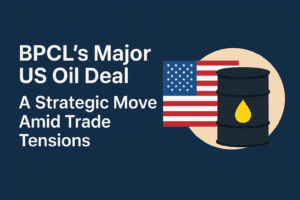BPCL’s Major US Oil Deal: A Strategic Move Amid Trade Tensions
BPCL’s major five-month tender for 10 million barrels of U.S. oil signals a strategic shift in India’s energy policy. Awarded to Glencore, this deal doubles BPCL’s prior U.S. imports and directly supports India’s pledge to increase American energy purchases to $25 billion annually. The move arrives amid heightened U.S.-India trade tensions, including recent U.S. tariffs, and serves as a diplomatic gesture to narrow India’s substantial trade surplus.
While India continues importing discounted Russian crude, this significant U.S. commitment demonstrates a deliberate effort to diversify suppliers and strengthen ties with Washington. The chosen WTI Midland crude also aligns with Indian refiners’ operational needs and reflects improved shipping economics. Looking ahead, India plans broader U.S. energy imports, including potential tax reforms for propane and LNG by 2026, solidifying this partnership as a cornerstone of both energy security and trade diplomacy.

BPCL’s Major US Oil Deal: A Strategic Move Amid Trade Tensions
India’s Bharat Petroleum Corporation (BPCL) has secured a significant five-month supply of US crude oil—doubling down on earlier commitments—in a deal that reveals deeper currents shaping global energy flows and US-India relations.
Key Details & Context:
- Volume & Timing: BPCL will import 2 million barrels/month of WTI Midland crude from November 2023 to March 2024 via trader Glencore—double its prior US tender volume.
- Trade Balance Leverage: With India’s $45.7B trade surplus with the US under scrutiny, this deal advances PM Modi’s 2023 pledge to boost US energy imports from $10B to $25B annually.
- Geopolitical Backdrop: The timing is critical. Recent US tariffs on Indian goods and pressure over India’s Russian oil imports make this a diplomatic signal.
Why This Matters:
- Diversification Beyond Russia: While India still relies heavily on discounted Russian crude, BPCL’s tender shows proactive supply-chain hedging. US oil now complements—not replaces—Russian barrels, insulating refineries from volatility.
- Refinery Economics: WTI Midland’s light, low-sulfur profile suits complex Indian refineries. Rising US-Asia arbitrage (shipping cost vs. price discount) makes these shipments increasingly viable.
- Long-Term Strategy: India plans to eliminate import taxes on US propane and LNG by 2026, signaling a structural energy partnership shift. This deal lays groundwork for that transition.
Unspoken Challenges:
- Trade Tensions: Despite this deal, US-India friction persists. Washington’s August 2025 tariffs and demands to curb Russian imports loom large.
- Global Sourcing Calculus: India walks a tightrope—balancing Russian discounts, OPEC+ relationships, and US diplomatic expectations. BPCL’s tender reflects this delicate equilibrium.
The Bigger Picture:
India’s energy imports are becoming a tool of economic statecraft. By ramping up US purchases, New Delhi aims to ease trade disputes while securing diverse, high-quality feedstock. For the US, it’s a strategic foothold in Asia’s fastest-growing oil market.
You must be logged in to post a comment.